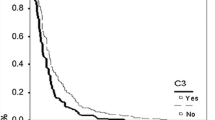Abstract
Background and aims
The prognostic value of the degree of apoptosis in colorectal cancer is controversial. This study evaluates the putative clinical usefulness of measuring caspase-3 activity as a prognostic factor in colonic cancer patients receiving 5-fluoracil adjuvant chemotherapy.
Materials and methods
We evaluated caspase-3-like protease activity in tumours and in normal colon tissue. Specimens were studied from 54 patients. These patients had either stage III cancer (Dukes stage C) or high-risk stage II cancer (Dukes stage B2 with invasion of adjacent organs, lymphatic or vascular infiltration or carcinoembryonic antigen [CEA] > 5). Median follow-up was 73 months. Univariate analysis was performed previously to explore the relation of different variables (age, sex, preoperative CEA, tumour size, Dukes stage, vascular invasion, lymphatic invasion, caspase-3 activity in tumour and caspase-3 activity in normal mucosa) as prognostic factors of tumour recurrence after chemotherapy treatment. Subsequently, a multivariate Cox regression model was performed.
Results
Median values of caspase-3 activity in tumours were more than twice those in normal mucosa (88.1 vs 40.6 U, p = 0.001), showing a statistically significant correlation (r = 0.34). Significant prognostic factors of recurrence in multivariate analysis were: male sex (odds ratio, OR = 3.53 [1.13–10.90], p = 0.02), age (OR = 1.09 [1.01–1.18], p = 0.03), Dukes stage (OR = 1.93 [1.01–3.70]), caspase-3 activity in normal mucosa (OR = 1.02 [1.01–1.04], p = 0.017) and caspase-3 activity in tumour (OR = 1.02 [1.01–1.03], p = 0.013).
Conclusion
Low caspase-3 activity in the normal mucosa and tumour are independent prognostic factors of tumour recurrence in patients receiving adjuvant 5-fluoracil-based treatment in colon cancer, correlating with poor disease-free survival and higher recurrence rate.


Similar content being viewed by others
References
Galanis E, Alberts SR, O Connell MJ (2000) New adjuvant therapy for colon cancer: justified hope or commercial hype. Surg Oncol Clin N Am 9:813–823
Watanabe T, Wu TT, Catalano PJ, Ueki T et al (2001) Molecular predictors of survival after adjuvant chemotherapy for colon cancer. N Engl J Med 344:1196–1206
Chung DC (1998) Molecular prognostic markers and colorectal cancer: the search goes on. Gastroenterology 114:1330–1332
Kerr JF, Winterford CM, Harmon BV (1994) Apoptosis. Its significance in cancer and cancer therapy. Cancer 73:2013–2026
Brent PJ, Pang G, Little G, Dosen PJ et al (1996) The sigma receptor ligand, reduced haloperidol, induces apoptosis and increases intracellular-free calcium levels [Ca2+] in colon and mammary adenocarcinoma cells. Biochem Biophys Res Commun 219:219–226
Ikenaga M, Takano Y, Saegusa M, Ohtani Y et al (1996) Apoptosis of colon cancers assessed by in situ DNA nick end-labeling method. Pathol Int 46:33–37
Roser S, Pool-Zobel BL, Rechkemmer G (2001) Contribution of apoptosis to responses in the comet assay. Mutat Res 497:169–175
Koornstra JJ, Jong S, Hollema H, Vries EG et al (2003) Changes in apoptosis during the development of colorectal cancer: a systematic review of the literature. Crit Rev Hemat Oncol 45:37–53
Rodel C, Grabenbauer GG, Papadopoulos T, Bigalke M et al (2002) Apoptosis as a cellular predictor for histopathologic response to neoadjuvant radiochemotherapy in patients with rectal cancer. Int J Radiat Oncol Biol Phys 52:294–303
Kawasaki H, Altieri DC, Lu CD, Toyoda M et al (1998) Inhibition of apoptosis by survivin predicts shorter survival rates in colorectal cancer. Cancer Res 58:5071–5074
Jonges LE, Nagelkerke JF, Ensink NG, van der Valden EA et al (2001) Caspase-3 activity as a prognostic factor in colorectal carcinoma. Lab Invest 81:681–688
Baretton GB, Diebold J, Christoforis G, Vogt M et al (1996) Apoptosis and immunohistochemical bcl-2 expression in colorectal adenomas and carcinomas: aspects of carcinogenesis and prognostic significance. Cancer 77:255–264
Evertsson S, Bartik Z, Zhang H, Jansson A et al (1999) Apoptosis in relation to proliferating cell nuclear antigen and Dukes stage in colorectal adenocarcinoma. Int J Oncol 15:53–58
Cohen GM (1997) Caspases: the executioners of apoptosis. Biochem J 326:1–16
Leonardos L, Butler LM, Hewett PJ, Zalewski PD et al (1999) The activity of caspase-3-like proteases is elevated during the development of colorectal carcinoma. Cancer Lett 143:29–35
Sen S, D’Incalci M (1992) Apoptosis. Biochemical events and relevance to cancer chemotherapy. FEBS Lett 307:122–127
Nita ME, Nagawa H, Tominaga O, Tsuno N et al (1998) 5-Fluorouracil induces apoptosis in human colon cancer cell lines with modulation of Bcl-2 family proteins. Br J Cancer 78:986–992
Hao X, Du M, Bishop AE, Talbot IC (1998) Imbalance between proliferation and apoptosis in the development of colorectal carcinoma. Virchows Arch 433:523–527
Hawkins N, Lees J, Hargrave R, O’Connor T et al (1997) Pathological and genetic correlates of apoptosis in the progression of colorectal neoplasia. Tumour Biol 18:146–156
Bedi A, Pasricha PJ, Akhtar AJ, Barber JP et al (1995) Inhibition of apoptosis during development of colorectal cancer. Cancer Res 55:1811–1816
Sinicrope FA, Hart J, Hsu HA, Lemoine M et al (1999) Apoptotic and mitotic indices predict survival rates in lymph node-negative colon carcinomas. Clin Cancer Res 5:1793–1804
Acknowledgements
This work was supported by the Spanish government through project FISS 01/1260.
Author information
Authors and Affiliations
Corresponding author
Rights and permissions
About this article
Cite this article
de Oca, J., Azuara, D., Sanchez-Santos, R. et al. Caspase-3 activity, response to chemotherapy and clinical outcome in patients with colon cancer. Int J Colorectal Dis 23, 21–27 (2008). https://doi.org/10.1007/s00384-007-0362-3
Accepted:
Published:
Issue Date:
DOI: https://doi.org/10.1007/s00384-007-0362-3




